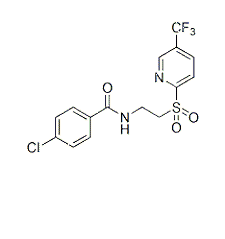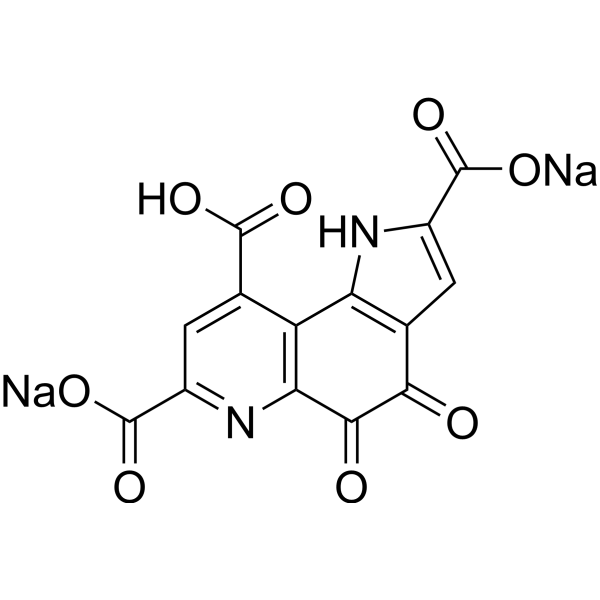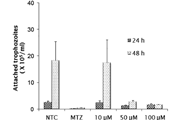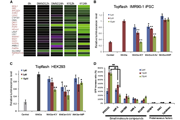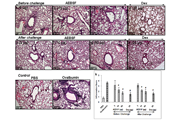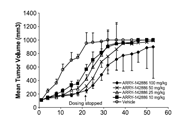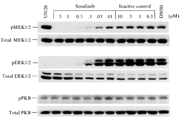-
生物活性
GSK3787 is a selective PPARβ (peroxisome proliferator-activated receptor β) antagonist which binds to Cys249 in the PPARβ binding pocket. PPARβ is essential in the catabolism of fatty acids. Studies indicate that GSK3787 antagonizes the agonistic effects of GW 0742. This inhibits upregulation of Angptl4 and Adrp mRNA expression in mice colon. In addition, GSK3787 acts in a dual role as a weak agonist and antagonist towards PPARγ.
Human PPARδ Binding and Functional Potency[1]
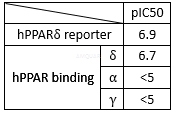
IC50-values (nM) at various time points for GSK3787 in PPARβ/δ[2]

* Curve fit was ambiguous.
The EC50 of PPARβ/δ competitive antagonism is 100 nM.[3]
-
体外研究
-
体内研究
-
激酶实验
TR-FRET assays[2]
The plate reader (Victor X4, PerkinElmer) was equipped with the recommended filters and set up according to recommendations of the assay manufacturer. The supplied assay buffer (pH 7.5) was added DTT to a final concentration of 5 mM. The Tb-anti-GST antibody and the GST-PPAR LBDs were thawed on ice and subsequently added in the given order to assay buffer to a 4x concentration of 20 nM Tb-anti-GST antibodies and 8 nM of GST-PPAR LBD. The mixtures were homogenized by gentle inversion. The test compounds and positive control compounds were serially diluted in DMSO, before final dilution to 2x concentration of 2μM in assay buffer. The negative control consisted of a volume of DMSO equal to the DMSO volume of the test compounds and positive controls (4% in the 2xsolutions). The tracer ligand Fluormone Pan PPAR Green was diluted in assay buffer to a 4x concentration of 80 nM/80 nM/20 nM for the PPARα-, PPARβ/δ- or PPARγassays, respectively. 20μL of test compound- or control compound solution, 10μL of tracer ligand solution and 10μL of the protein solution were added into black 96-well plates. The final concentrations were thus: 1μM test compound or control compound, 20 nM/20 nM/5 nM of tracer ligand for PPARα, PPARβ/δor PPARγ, respectively, 5 nM of Tb-anti-GST and 2 nM of the respective GST-PPAR LBD. The volumes in the wells were gently spun down with a plate centrifuge and subsequently mixed by orbital mixing on the plate reader for 30 sec before reading the wells at the stated time points. Between readings the plates were sealed and kept in the dark at ambient temperature. The IC50 determination and subtype selectivity evaluation were performed analogously. The final test compound concentrations used in the IC50 determination of GSK3787 was 100 nM. In the subtype selectivity evaluation, test compound concentrations of 1μM and 10μMwere used for all the evaluated compounds.
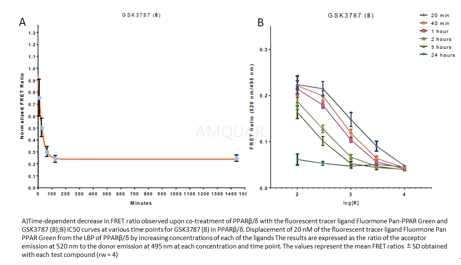
-
细胞实验
Cell Culture[4]
The human hepatocarcinoma cell lines HepG2 and Huh7, lung adenocarcinoma cell lines A549 and H1838, squamous carcinoma cell line A431, and the breast cancer cell line MCF7 were cultured according to the recommended procedures: HepG2, Huh7, A431, and MCF7 cells were cultured in DMEM; A549 cells were cultured in Ham’s F12K medium; and H1838 cells were cultured in RPMI 1640 medium supplemented with 10% fetal bovine serum (FBS) and 1% penicillin-streptomycin.
Cell Proliferation Assays
Cell proliferation was examined using real-time monitoring of cell proliferation of adherent cells using the xCELLigence System. Indicated cells were plated in triplicate in single wells of an E-Plate 16 at densities ranging from 500 - 80000 cells/well. Cell proliferation was monitored every 15 min using the RTCES System for up to 120 h. Cell-sensor impedance is expressed as an arbitrary unit called the Cell Index. The Cell Index at each time point is defined as (Rn-Rb)/15, where Rn is the cellelectrode impedance of the well when it contains cells and Rb is the background impedance of the well with the media alone. Start and end times were selected during the log-growth phase and used to calculate doubling time with RTCA Software version 1.2 from independent triplicate wells per treatment. For examination of the effect of GW0742 on cell proliferation, the human squamous cell carcinoma cell line A431, human liver cancer cell lines HepG2 and Huh7, the human lung cancer cell lines A549 and H1838, or the human breast cancer cell line MCF7 were seeded and treated with GSK3787 (0.1, 1.0, or 10μM).
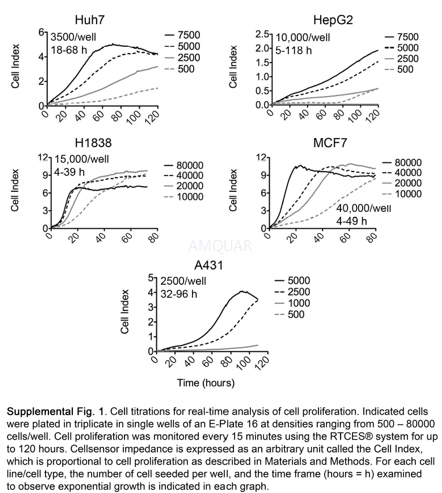
-
动物实验
Mice[5]
All of the wild type FVB/N JCL mice were 6–8 weeks old and were maintained under specific pathogen-free conditions.
Preparation and application of GSK3787
GSK3787 was dissolved in DMSO, vortexed, diluted in acetone to yield a final concentration of 50 μM and stored at room temperature. A reagent solution was stored at 4 °C, kept free of light and freshly prepared once a week. GSK (200 μl) was applied to a 2 × 2 cm area of mouse dorsal skin 1 day before as well as4 and 8 h after IMQ treatment
Treatment of mice
A dose of 5mg of 5% IMQ was applied to the ear of each mouse every day for 6 consecutive days. GSK3787 (50 μM) was applied to the ear 4 and 8 h after the IMQ treatment; the GSK3787 was of 98% purity.
Real-time PCR
Total RNA was extracted from mouse dorsal skin with Maxwell® RSC simply RNA Kits according to the manufacturer's instructions. cDNA was reverse transcribed from the total RNA samples using the GoScript™ Reverse Transcription System. mRNA levels of GAPDH, alox8, IL-17A, IL-1β, IL-22, and IL-23a were measured via real-time quantitative PCR (qPCR) analysis, which was performed on a Roche LightCycler 480II. Data were normalized to GAPDH, and relative expression
levels were calculated by the comparative Ct method.
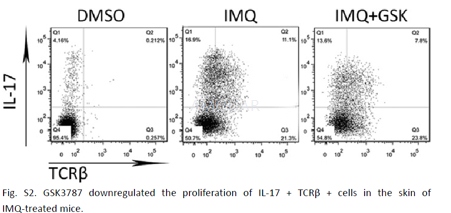
-
不同实验动物依据体表面积的等效剂量转换表(数据来源于FDA指南)
|  动物 A (mg/kg) = 动物 B (mg/kg)×动物 B的Km系数/动物 A的Km系数 |
|
例如,已知某工具药用于小鼠的剂量为88 mg/kg , 则用于大鼠的剂量换算方法:将88 mg/kg 乘以小鼠的Km系数(3),再除以大鼠的Km系数(6),得到该药物用于大鼠的等效剂量44 mg/kg。
-
参考文献
[1] Shearer BG, Wiethe RW, Ashe A, et al. Identification and characterization of 4-chloro-N-(2-{[5-trifluoromethyl)-2-pyridyl]sulfonyl}ethyl)benzamide (GSK3787), a selective and irreversible peroxisome proliferator-activated receptor delta (PPARdelta) antagonist. J Med Chem. 2010;53(4):1857-1861.
more
分子式
C15H12ClF3N2O3S |
分子量
392.78 |
CAS号
188591-46-0 |
储存方式
﹣20 ℃冷藏长期储存。冰袋运输 |
溶剂(常温)
|
DMSO
≥10 mg/mL |
Water
<1 mg/mL |
Ethanol
<1 mg/mL |
体内溶解度
-
Clinical Trial Information ( data from http://clinicaltrials.gov )
注:以上所有数据均来自公开文献,并不保证对所有实验均有效,数据仅供参考。
-
相关化合物库
-
使用AMQUAR产品发表文献后请联系我们





